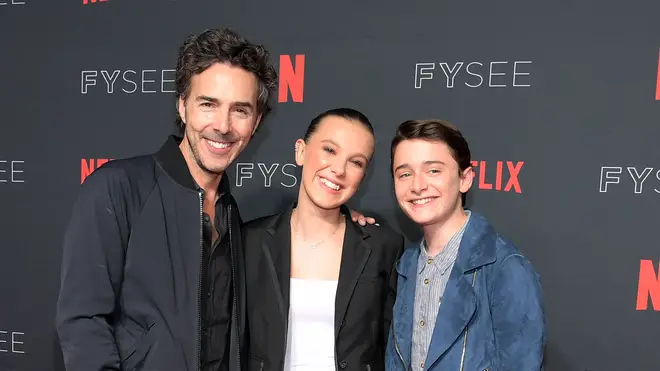Shawn Levy talks his new film The Darkest Minds starring Amandla Stenberg and Stranger Things 3
6 August 2018, 16:54

Shawn reveals that he first saw Amandla perform in a school production of Grease at his daughter's school way before The Hunger Games.
It’s an age-old question: does life imitate art or is it the other way around? For The Darkest Minds, a story which involves the internment of children in prison camps, it became uncomfortably close to real-life news.
Based on the YA novel by Alexandra Bracken, and produced by Shawn Levy – best known as the executive producer and co-director on Stranger Things – the film is set in the not-so-distant future in which a deadly virus called IAAN has wiped out 98% of all children under the age of twenty. The surviving children develop special powers – ranked from ‘green’ super intelligence to ‘red’ pyrokinetic powers. The government believes that they’re a threat and forcibly imprisons them. We follow Ruby, played by actress and woke queen Amandla Stenberg, as she escapes the internment camp and forms a new family with other kids with special powers, as they search for safety from the government and other nefarious forces.
The movie was filmed last year and release coincides with the aftermath of Donald Trump’s decision to forcibly separate the children of immigrant families from their parents at the US/Mexico border. Footage of the children from inside the internment camp cages shocked the world, and Trump eventually caved in to political pressure to drop the policy and reunite the families. It is in this context that The Darkest Minds internment storyline comes across as an astute political takedown of Trump’s immigration policy, but that’s not the only part of the film that strikes a zeitgesty, social justice note.
We caught up with producer Shawn Levy over the phone to talk through the intentional and unintentional political undertones of the film, the first time he saw Amandla perform in a high school production of Grease at his daughter’s school, and how Stranger Things 3 is shaping up to be the best season yet.
PopBuzz: One thing that surprised me about the film was how political it seems. Based on the trailer, I didn’t go into it thinking it would be but the internment camps felt uncomfortably similar to what’s been happening in the US recently with the separation of immigrant families. Did you discuss the political undertones to the film while you were making it?
Shawn Levy: Well, this is what’s crazy. I’ve been developing this project for about five years, and so it was never designed or intended to be an overtly political film. It was always going to explore themes of difference, and society’s fear of difference, but it was really more focused on a youth uprising and empowerment of the different. So, those themes are very much still at work but the extent to which the internment camps became timely is genuinely stunning to us and, quite frankly, not at all by design.
PB: The film is a little bit like a trojan horse in that way. You go into it thinking this will be a fantasy/sci-fi thing, but it has all this social commentary going on underneath, especially how the children are categorised because their powers and how they are treated because of them was really well done. How important was it to get those themes right?
SL: Yeah, it was all a part of it. I wanted the movie to be thematically rich. The categorisation of the young people and their incarceration based on the powers – that’s from the book. We were trying to honour the source-material, but we wanted to do it in a way that was also aspirational, so that the movie wasn’t relentlessly bleak. It has a bleak premise but ultimately it becomes about a de-facto family of young people being formed. And a road trip, if you will. The freedom of young people on the road and on the road of self-discovery.
PB: The relationship between the kids is the beating heart of the film, and so the casting for those parts must have been crucial to the whole film. What was the casting process like and how did you end up with Amandla, Harris, Miya and Skylan?
SL: It was little by little. Obviously, casting Ruby was the linchpin and the centre piece. We’d known Amandla’s work since Hunger Games and I had known Amandla’s work even more so because she was a student at my eldest daughter’s high school. So, I had seen Amandla on stage at high school in productions for several years. I literally saw Amandla perform ‘Beauty School Dropout’ in the high school production of Grease.
PB: And was she good?
SL: She was damn good! And that’s my point. Amandla is an unusual actor and young woman because she’s got a formidable power and there’s no frivolousness to Amandla - on screen or in life. She has a weight and a gravity to her that I think felt like Ruby. So, that was Amandla and casting the other roles came about because of chemistry readings between Amandla and the final candidates for each of the other roles and we cast based on who had the best connection and chemistry.
PB: Going back to what you said about wanting to avoid the film to being too bleak, this isn’t your first project involving a gang of kids being hunted down by malicious adults or evil forces, and so I was wondering what it is about the kids vs the world, or light vs dark, themes in your work that you appear to be so drawn to?
SL: That absolutely seems to be the case. I can’t escape it. I think whether one has a particularly challenging childhood – which was my personal experience – or whether one grows up relatively normally, all of us as young people feel that we are passengers on someone else’s train. That we are less-empowered than the bigger people around us and that feeling of helplessness can feel isolating and disempowering. And I think there is a collective yearning in all young people to feel that they can define their world. That they can shape their experience. So, what a movie or TV show like Stranger Things can do, it can take that yearning and it can give the wish fulfilment of making it real by pushing the circumstances into the unrealistic by giving young people literal powers, and then you explore of the theme of young people’s power.
PB: There are some parallels between Stranger Things and The Darkest Minds but perhaps the powers that the kids have in The Darkest Minds build on that theme you were just describing?
SL: Well I would say that, first of all, that the similarities between Stranger Things and The Darkest Minds were not intended because I optioned the book of The Darkest Minds years before I have even come across the script to Stranger Things, but it is interesting. Both of them are about connections between young people. It’s ultimately about young people living outside of the norm who come together and connect in a powerful way. That’s Mike, Eleven and the AV Club, and that’s Ruby, Liam, Zoo and Chubs.
PB: So, what are you working on next and how are things progressing on Stranger Things 3, as I know you're filming that right now?
SL: I’ll give you the short answer because I’ve been directing Stranger Things 3 and spent the day yesterday with the [Duffer] brothers in the edit room and I can tell you truly, honestly, that it’s shaping up to be our best yet.
The Darkest Minds is out August 10th in the UK.






















